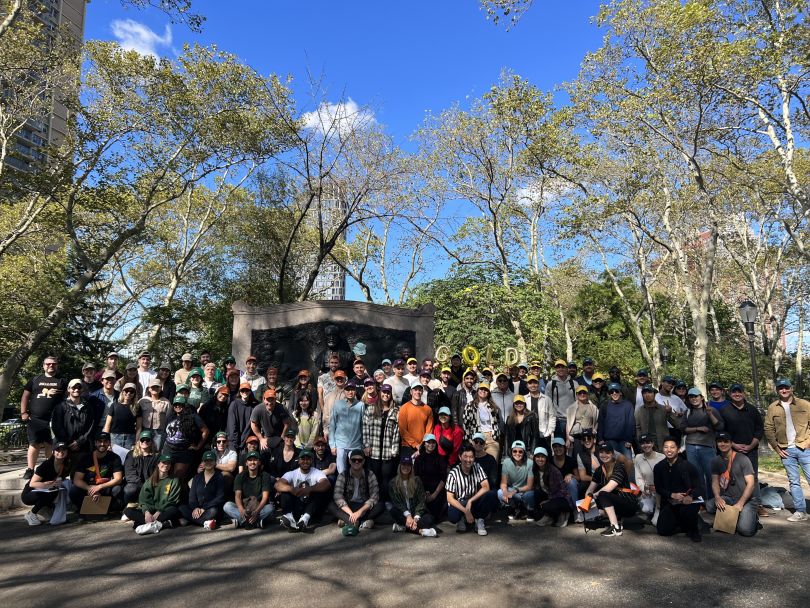On a Friday evening four years ago, Hope Fawley, Block Renovation’s VP of new initiatives, arrived at a New York City apartment in Union Square.
This was her first week at the company, and she was surrounded by four other contractors — rough, tough and wielding tape measures — all vying for the same homeowner contract.
It seemed like a daunting task, and Fawley was still learning about bathroom renovations. Plus, Block was a new company at the time, and Fawley couldn’t yet offer direct construction plans like the rest of her competition.
But Block had another goal in mind: By sending her to the meeting, the company allowed her a firsthand, investigative look at the pain points faced by potential clients, unfiltered by cold calls and emails.
“It was clear that this homeowner had no idea who to turn to,” Fawley recalled. “Everyone was selling him something different, so there was a lack of trust.”
What Fawley had from Block was a solution — an all-in-one platform that would shift the burdens of renovations on her company, from design and planning to contractor outreach and more.
Fawley didn’t win the job, but she had a memorable takeaway and an illuminating lesson on the value of seeing the scope of the industry’s challenges firsthand. More importantly, she understood that Block Renovation was a company that actively sought out innovative solutions to problems often overlooked by the industry.
Block Renovation attempts to streamline innovation in a traditionally fragmented industry in order to help homeowners navigate the nebulous web of choices available to them. As a believer of the company’s vision, and wizened by stories of traumatic renovations, Fawley bought into Block’s mission statement before there was even a product to promote, with only three other people in the meeting room.
Four years later, that dedication to give homeowners a fresh start has not wavered, and hundreds of jobs have been completed from coast to coast.
“There’s nothing better than having a resource you can trust and a brand that’s putting its name behind the success of your investment,” she said passionately. “It’s an expensive process, and we’re not in a world where most people have this kind of disposable income.”
Building Blocks
Homeowners, however, only represent half the business. “Construction professionals and small construction businesses are also a critical side of the Block marketplace,” Erik Ornitz, general manager of B2B, explained.
With the anticipation of a recession, it’s become even more important for the company to build downturn-resistant processes into a side of the industry vulnerable to supply disruptions and market conditions. Tighter cash flows and fewer profitable jobs incentivize contractors to pick the right tools, often the more affordable one.
“We’re being thoughtful about how our products address critical concerns to a construction company,” he said. “When you think about acute challenges, we want to focus on solving critical pain points for people in that environment.” Ornitz is energized by the opportunity to bring modern, design-forward tech thinking into the backbone of the American economy. Leading directly into the culture of innovation, he leads his own incubator, which is focused on finding solutions.
“I wouldn’t say we figured it all out yet,” he said. “But there’s a genuine excitement to be part of a group of technologists that ask those questions and solve their problems.”
Finding innovative solutions for entrenched problems requires a similar ethos of iterative processes and decision-making internally. After three-and-a-half years at Block Renovation, Head of Business Operations Direct Danny Wang has seen firsthand the company’s resilience in honing a competitive, cutting edge.
At its core, the company’s building blocks have remained versatile enough to not be mired by serious challenges, a situation prominently displayed during the pandemic when supply chain bottlenecks threatened business operations.
“One of the cabinet vendors that we use on projects went out of business overnight,” Wang said incredulously. “So we had to pivot people to redesigns and figure out new vendors. If they had purchased cabinets through them directly, they would’ve been hung out to dry.”
That Block Renovation was able to rectify challenges across all projects that were impacted was the rule, not an exception. Adapting to challenges, from last-minute emergencies to long-term market trends, informs innovation for the company.
“It sparked things like investment and innovation in the tools that we use for our design systems,” Wang said. “Looks that are more interchangeable to suit an overall design intent, not being beholden to a specific brand.” What should have been a catastrophic supply chain issue ended up inoculating company processes against similar obstacles moving forward.
To see how Block Renovation iterates itself — adding value for stakeholders, homeowners and its own employees — Built In sat down with Fawley, Ornitz and Wang for a multi-faceted look at the company’s innovative renovations, inside and out.

What does innovation look like within Block Renovation?
Fawley: Innovation isn't just about technology, it’s about our team changing and adapting to the nature of what we thought would happen with the pandemic. We tightened our belts, and then had to grow quickly because people were at home, and they weren't considering renovations. The business itself had to move in ways that we weren't anticipating and many of those were positive. So we as a group had to wear many hats and execute in ways that we certainly weren't planning.
On the sales side of the business, we're constantly looking at what our goals are, and whether or not we're achieving them. One thing we've struggled with at Block is introducing too many people throughout the homeowner’s journey, from the first salesperson to the project planner to our design ops. There are too many people in the funnel.
The product that Danny is running is called Direct, which gives us the opportunity to get the homeowner and the contractor together much faster, but with similar expectations that our core product delivers on. Fueled by different technologies, it allows us to scale in a more efficient way from a headcount perspective because there are fewer people involved, especially on the operating side.
Wang: We have a long lifecycle of a user working with us on a renovation — it takes months to renovate from end to end. Change for change’s sake is costly for our teams, so if we’re going to do it, we have many iterations of what Block is at various times, because it will take someone six to eight months to go through our funnel. We’re disciplined about making sure when we make changes so as to not create a lot of friction for the teams actually operating on these projects in their day to day. We do a good job in process changes and how to optimize things, tying them back to an actual tangible goal or an outcome that we’re trying to see. We want to protect the individuals on the team from change whiplash.
“We want to protect the individuals on the team from change whiplash.”
Ornitz: My team is building something from the ground up, a new product where we can leverage our existing market position to build out something that contractors can use to run their businesses. Our guiding principle is user-centricity. We’re going through periods of deep listening and interviewing and talking with customers, then coming up with a few theses and ideas, and then going back and talking to those customers again. We put ourselves in the shoes of salespeople doing pitches, like in the early days of Block, to figure out why they might say yes, but maybe even more importantly, why they might say no. We want to build something that’s loved by a core set of customers in the early days and expand from there.
How does the team tackle industry challenges, and adapt to market demands and constraints?
Wang: Block is an interesting space where we have technology, but we also have a physical product and experience for both homeowners and contractors. A lot of what we've innovated on is constructing the ideal journey through a renovation for a homeowner, as well as for building tools for contractors to renovate easier and alleviate the mess that is construction.
During the pandemic, there was a shutdown of most of the cities that we operated in, which allowed us more time to innovate on our systems and tools. There was this general push to be more digital, as homeowners became more accepting of using digital tools to manage the project themselves. This helped us push the industry to be more open to technology, rather than rely on archaic concepts like needing a project manager at the site for boots on the ground. So in all, it pushed us to adopt these tools, develop these strategies and get there faster.
Pandemic Processes
Ornitz: Thirty years ago, most of contractor management was referrals and Yellow Pages — very pen and paper. Today, a lot of it still is. It’s hard to build and grow a small construction company, and you've got a lot of people who care deeply about their trade. A lot of it is done through channels that are tough for contractors, and they’re increasingly struggling with the economics of a job with material pricing and labor costs going up. The cool part of Block is we're dreaming big, trying to use software to unlock painless growth for contractors that want to move beyond their current scope, but are limited by the complexities of a construction company.

What client feedback have you received that validated Block Renovation’s commitment to constant innovation?
Wang: Not all renovations go seamlessly. It’s renovating at the end of the day, and there's always something that comes up. I remember there was a specifically challenging project where I thought that the homeowner was going to be so mad at us. Turns out they were delightful and grateful to have a partner through all of this, because they would have had nobody to turn to if this had happened without Block’s involvement. In my mind, it shifted how I thought about the importance and the value of a trusted brand and partner. Renovations are messy, and we can't make every single one perfect, but we can make them more predictable. And when they’re going off the rails, you have a support team to help your project back on track.
Fawley: We actually see a ton of people come to us that are very early on in their homeowner journey. Imagine how stressed they are — how much down payment they invested and now they want to renovate their space, with full-time jobs and potentially young children. Block is trying to alleviate those stresses for both sides of the aisle, homeowners and contractors. We've seen all walks of life come through the renovation process, people with young kids and people that are older, finally investing in something that they've been wanting to do for a long time. We're not changing the world with renovations, but we are helping people invest in their own realities and where they ultimately spend the vast majority of their time.








